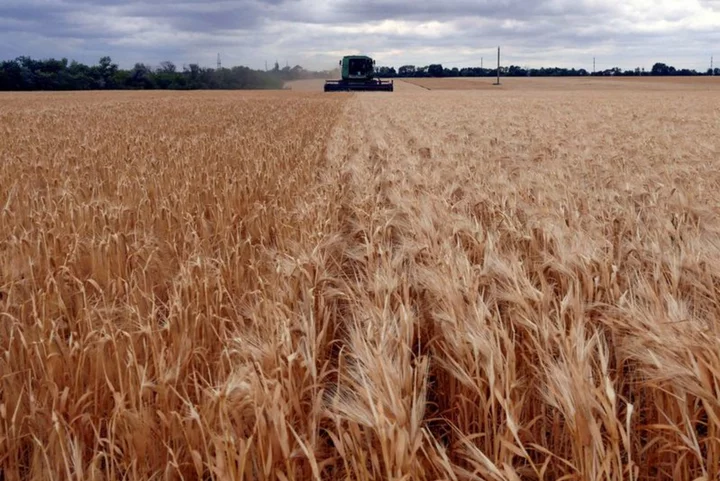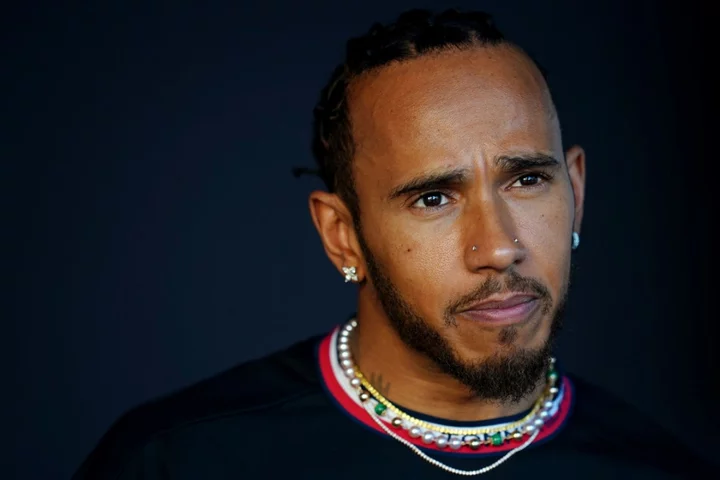By Michelle Nichols
UNITED NATIONS (Reuters) -There are a "number of ideas being floated" to help get Ukrainian and Russian grain and fertilizer to global markets after Moscow quit a deal allowing the safe Black Sea export of Ukraine grain, the United Nations said on Tuesday.
The Black Sea deal was brokered by the U.N. and Turkey in July last year to combat a global food crisis worsened by Russia's February 2022 invasion of Ukraine. Ukraine and Russia are among the world's top grain exporters.
Russia's withdrawal on Monday, which included revoking its guarantees for safe navigation, also ended a pact between the United Nations and Moscow in which U.N. officials agreed to help Russian food and fertilizer exports reach world markets.
However, U.N. Secretary-General Antonio Guterres "will continue to explore all possible avenues to ensure that Ukrainian grain, Russian grain, Russian fertilizer are out on the global market," U.N. spokesman Stephane Dujarric said.
"There are a number of ideas being floated," he told reporters, without giving details.
Ukraine's Foreign Minister Dmytro Kuleba said an alternative to the Black Sea grain deal had to be found and "there are very active discussions now."
The European Union said on Tuesday it is seeking to transport more Ukrainian grains via road and rail. While appreciative of EU efforts, Kuleba said Ukrainian exports through Europe would not be able to "compensate for the absence of deliveries from Ukrainian ports on the Black Sea."
Kuleba said the focus on reviving Black Sea shipments was either to continue within the existing framework or create a new model, but added: "The problem, of course, is what is going to happen if Russia decides to attack a vessel carrying grain."
"We have to take risks and we have to demonstrate that we can carry on without Russia," he told reporters on Tuesday during a visit to the United Nations.
Russia struck Ukrainian ports on Tuesday, a day after quitting the Black Sea grain deal. The Kremlin also warned that attempts to ship grain from Ukrainian Black Sea ports without security guarantees from Russia would carry risks because it said Kyiv used those waters for military activities.
'HUNGRY PEOPLE'
A cargo insurance facility providing cover for Ukraine grain shipments traveling under the Black Sea deal has been suspended. The marine cargo and war facility provided cover of up to $50 million per cargo.
Chicago wheat futures finished higher on Tuesday after Ukrainian officials said the Russian air strikes had damaged infrastructure at the port of Odesa.
Moscow has suggested that if demands to improve exports of its own grain and fertilizer were met it would consider resurrecting the Black Sea agreement. It quit because it said those demands had not been met and it complained not enough Ukraine grain was reaching poor countries under the deal.
But the U.N. argued the arrangement has benefited those states by helping lower food prices more than 20% globally. Ukraine has also been a key supplier of grain for the U.N. World Food Programme's efforts to fight hunger.
"This is going to make our ability to feed hungry people that much more difficult," WFP's regional director in East Africa, Michael Dunford, said of Russia's withdrawal, which would "exacerbate what is already a terrible situation."
Russia has said it was prepared to supply poor countries in Africa with grain for free and the Kremlin said on Tuesday that the matter would be discussed at a Russia-Africa summit in St. Petersburg next week.
Ukraine's President Volodymyr Zelenskiy said on Tuesday in his nightly video address that without Ukraine's exports "the deficit on the global market will, unfortunately, be quite tangible."
"And not only for the poorest countries. Different countries will feel it - from Libya and Egypt to Bangladesh and China," he said. "We are working with our partners to prevent this."
(Reporting by Michelle Nichols; additional reporting by Christophe Van Der Perre in Nairobi and Ron Popeski; Editing by Tim Ahmann, William Maclean and Daniel Wallis)









